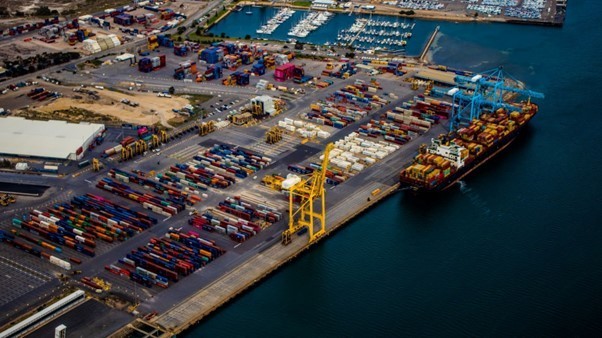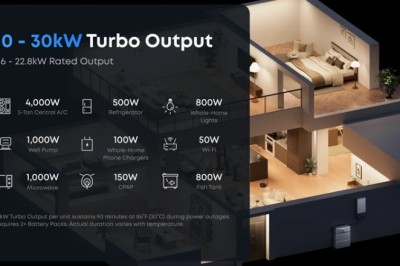views

Photo by Alex Duffy on Unsplash
Smart Port Terminals and the IoT: Revolutionizing Logistics Through Data-Driven Marketing
In the dynamic landscape of global trade and transportation, the integration of smart port terminal solutions and the Internet of Things (IoT) has emerged as a transformative force, ushering in a new era of efficiency and innovation.
This shift is not only redefining the way goods move across borders but is also opening up unprecedented opportunities for data-driven marketing strategies within the logistics sector.
The Power of Connectivity in Smart Port Terminals
Smart port terminals leverage IoT technologies to connect various elements within the port ecosystem, creating a seamless flow of information.
From container tracking and equipment monitoring to predictive maintenance, these solutions enhance operational visibility and enable proactive decision-making.
The real-time data generated by IoT sensors allows for a more accurate assessment of port activities, optimizing resource allocation, and reducing downtime. This interconnected environment fosters a level of efficiency that was once considered unattainable.
For marketers, this translates into a treasure trove of valuable insights. The ability to access granular data about cargo movements, dwell times, and traffic patterns enables a more precise understanding of customer needs and market trends.
Data-Driven Marketing: Transforming Logistics Dynamics
In a world driven by information, data becomes the cornerstone of effective marketing strategies. Smart port terminals leverage this data to craft targeted and personalized marketing campaigns that resonate with the needs of stakeholders.
Precision Targeting for Enhanced Efficiency
Gone are the days of generic marketing approaches. Smart port terminals utilize data-driven insights to target specific audiences, ensuring that marketing efforts are not only efficient but also tailored to the unique requirements of each segment within the logistics ecosystem.
Enhancing Customer Experience Through Real-Time Insights
The integration of IoT devices in smart port terminals extends beyond operational efficiency as it can also directly impact the customer experience. Real-time data insights allow terminals to provide clients with accurate, up-to-the-minute information on shipments, leading to heightened satisfaction and loyalty.
Challenges and Opportunities Ahead
While the integration of IoT in smart port terminals presents numerous opportunities, it also comes with its share of challenges. Let’s look at both below!
Challenges:
- Cybersecurity Concerns: The integration of IoT in smart port terminals brings with it a heightened risk of cyber threats. The vast network of interconnected devices creates potential vulnerabilities that could be exploited by malicious actors. Securing these terminals against cyberattacks becomes paramount, necessitating robust cybersecurity measures and constant vigilance.
- Interoperability Issues: The logistics industry is a complex ecosystem involving multiple stakeholders, each with its own set of technologies and systems. Achieving seamless interoperability between these diverse systems poses a significant challenge. Smart port terminals must navigate through different communication protocols and data formats to ensure a harmonious flow of information across the entire supply chain.
- Standardized Protocols: With various IoT devices and technologies in use, the absence of standardized protocols can impede the smooth integration of smart port terminals. Establishing industry-wide standards is essential to ensuring compatibility and interoperability, streamlining operations and communication across terminals, carriers, and other components of the logistics network.
Opportunities:
- Competitive Advantage: Companies that successfully address and overcome these challenges position themselves at the forefront of innovation, gaining a distinct competitive advantage. The ability to navigate the complexities of IoT integration demonstrates adaptability and forward-thinking, setting these companies apart in the rapidly evolving logistics landscape.
- Enhanced Efficiency and Cost Savings: While challenges exist, the successful integration of IoT in smart port terminals opens the door to unparalleled efficiency. Automated processes, predictive maintenance, and data-driven decision-making contribute to streamlined operations, reducing costs and enhancing overall efficiency in the movement of goods.
- Data-Driven Insights: The extensive data generated by IoT-connected terminals is a crucial resource for insightful analytics. Corporations can analyze this data to understand operational patterns, customer behaviors, and market trends, leading to more informed decision-making and the development of targeted strategies, ultimately contributing to improved business outcomes.
- Innovation and Industry Leadership: Being adept at overcoming IoT integration challenges places companies at the forefront of logistics innovation and leadership. Pioneering solutions to cybersecurity concerns, interoperability issues, and standardization sets a precedent for the industry, encouraging further innovation and establishing a company as a trailblazer in adopting transformative technologies.
Navigating the Future of Smart Port Terminals and IoT Logistics
Looking ahead, the future of smart port terminals and IoT in logistics promises even more advancements.
- 5G Connectivity: The adoption of 5G technology is poised to revolutionize connectivity in smart port terminals. Ultra-fast and low-latency communication will enable real-time data processing and decision-making, further optimizing terminal operations and paving the way for innovative applications.
- Edge Computing: Future trends in edge computing will play a pivotal role in processing data closer to the source, reducing latency, and enhancing the responsiveness of smart port terminals. This decentralized approach to data processing aligns with the growing need for quick and efficient decision-making in logistics.
- Sustainable Practices: The logistics industry is increasingly focusing on sustainability. Future trends will likely see smart port terminals incorporating IoT to monitor and optimize energy consumption, reduce emissions, and implement eco-friendly practices, aligning with global efforts toward a more sustainable supply chain.
Conclusion
Right now, we’re experiencing a new era in logistics thanks to smart port terminals, powered by the synergy of IoT and data-driven marketing. Beyond productivity and order, this shift also drives us towards precision, innovation, and superior customer experiences.
As smart port terminals lead the charge, the future of logistics is defined by seamless connectivity and unparalleled efficiency.

























Comments
0 comment